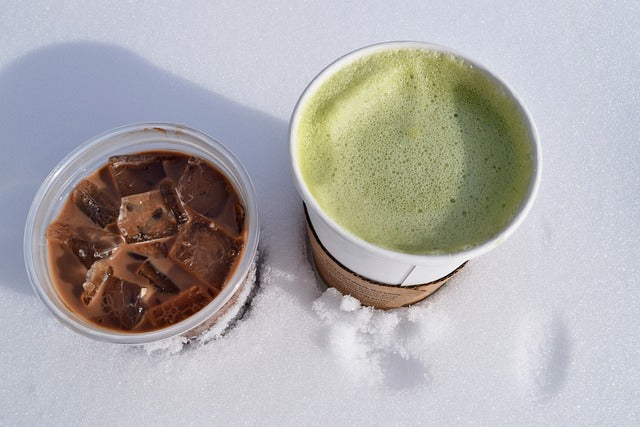
Why Matcha Is Good for You: A Healthier, Calmer Choice Than Coffee | Zenergy Tea
Share
A Personal Journey: From Coffee Rituals to Matcha Calm
For years, I was a coffee lover. My mornings began with a latte, carefully made with steamed milk and a balanced shot of espresso. The ritual felt essential. Without coffee, a headache was almost guaranteed by noon.
That changed during a winter trip to Kyoto. It was New Year’s morning, and snow had just begun to fall—rare and quiet in the city. I set out early to see Kinkaku-ji covered in white. Normally, I would hunt for coffee, but none of the shops near my hotel seemed right. Then I noticed a small tea shop on the corner, its noren curtain swaying with the cold wind.
Inside, the space was simple and calm. I ordered my first matcha latte, not expecting much. The first sip surprised me. It was green, grassy, and smooth, with a soft sweetness—like galloping across the wide grasslands of my hometown, fresh air filling my lungs.
I left the shop and walked into the snow, expecting to crave coffee later. But I didn’t. The matcha gave me a steady flow of energy that lasted the entire day, without the afternoon crash. It was a calm alertness, something I had never felt from coffee.
That was my first answer to the question why matcha is good for you—because it changes not just your body, but your state of mind.

What Is Matcha and Why It’s Unique
Before asking is matcha tea good for you, it helps to know what matcha is. Matcha is a type of green tea powder, made from the young leaves of the Camellia sinensis plant. Unlike loose-leaf tea, where you steep and discard the leaves, with matcha you consume the entire leaf in powdered form.
The leaves are grown under shade for several weeks before harvest. This shading boosts chlorophyll and amino acids, especially L-theanine, which plays a role in the calm focus many drinkers feel. After harvest, the leaves are steamed, de-stemmed, dried, and stone-ground into a fine powder. This is what we call matcha powder.
Because you’re drinking the whole leaf, matcha contains higher levels of caffeine and antioxidants than regular brewed green tea. This unique preparation is one reason health researchers often single it out.
And yes, does matcha have caffeine? Absolutely. A typical cup (1–2 grams of powder) contains 38–89 mg of caffeine, depending on quality and preparation. That’s less than coffee, which ranges from 95–200 mg per cup, but more than most green teas Harvard Health.

Is Matcha Green Tea Good for You? More Than Just Energy
Since matcha is a type of green tea, it shares many of the same health properties—just in higher concentrations.
Antioxidant power: Research shows green tea catechins can reduce oxidative stress and inflammation Harvard Health. Matcha delivers more catechins per gram than regular brewed tea because you ingest the full leaf.
Heart health: Green tea consumption is linked to lower risk of heart disease. Matcha may be even stronger in this role, though large-scale studies are still ongoing.
Brain health: Clinical studies suggest that L-theanine and caffeine together improve attention, memory, and reaction time PubMed.
So is matcha green tea good for you? Yes. It provides the benefits of green tea—plus an intensified dose thanks to its powdered form.
Is Matcha Latte Good for You? Balancing Indulgence and Health
For many beginners, the first step is not straight matcha, but a matcha latte. A matcha latte combines the powder with milk (dairy or plant-based) and sometimes sweetener.
But is matcha latte good for you? The answer depends on how it’s made.
Good side: A latte still delivers caffeine, antioxidants, and L-theanine. For newcomers, it makes the taste more approachable.
Downside: Adding sugar or flavored syrups reduces the health value. Harvard Chan School notes that excess sugar cancels out many of the benefits of tea Harvard T.H. Chan.
The best way to enjoy a matcha latte is to keep it simple: quality matcha powder, unsweetened milk, and minimal added sugar. That way you get the best of both worlds—health and comfort.
Matcha vs Coffee: A Calm Energy Choice
Now we return to the main comparison: matcha versus coffee.
Coffee
High caffeine (95–200 mg per cup).
Rapid spike in alertness, often followed by a crash.
Jitters, anxiety, or stomach upset for some people.
Addictive cycle of needing more cups as tolerance builds.
Matcha
Moderate caffeine (38–89 mg per cup).
L-theanine balances caffeine, leading to calm focus.
Lower risk of jitters and anxiety.
Antioxidants and catechins support heart and metabolic health.
From my own experience, matcha replaced the rollercoaster of coffee with a steady rhythm. Instead of bouncing between high and low, I move through the day with balance. The energy feels clean, almost like riding across a wide field on horseback—swift, free, and steady, without stumbling.
That’s one of the clearest reasons why matcha is good for you—it changes not only health markers but also how your day feels.

Summary
So, why matcha is good for you? Because it gives more than energy. It offers calm focus, antioxidants, and a healthier daily rhythm.
Compared to coffee, matcha provides moderate caffeine balanced by L-theanine, reducing jitters and crashes. Its antioxidants support heart and metabolic health, while its taste and ritual connect you to something calmer and more mindful.
For me, the first matcha in snowy Kyoto tasted like galloping across the grasslands of my hometown—fresh air, open space, and steady strength. That memory still returns each time I whisk a bowl.
That is why matcha is good for you—and why it might become your favorite way to start the day.
The matcha I use

Aileen Gong is a food creator, sommelier, and graduate of the School of the Art Institute of Chicago.
She shares quiet, beautiful recipes that celebrate simple rituals and mindful flavors.
She grows blueberries in pots, hand-whisks her matcha, and believes every drink can be a small moment of peace.
Is matcha good for you?
Yes. Research from Harvard Health notes that matcha contains high levels of antioxidants, moderate caffeine, and L-theanine, all of which support heart, brain, and metabolic health.
Is matcha latte good for you?
It can be. A simple latte made with pure matcha powder and unsweetened milk is healthy. But added sugars or syrups reduce the benefits.
Why is matcha good for you?
Because it combines caffeine and L-theanine, matcha provides steady energy without jitters. It’s also rich in antioxidants, which may protect against heart disease and inflammation.
Does matcha have caffeine?
Yes, about 38–89 mg per cup, less than coffee but more than regular green tea.
What does matcha taste like?
Matcha has a fresh, grassy flavor with natural sweetness and umami depth. Some describe it as earthy or creamy, depending on preparation.
How to make matcha?
Sift 1–2 grams of matcha powder into a bowl, add hot water (not boiling), and whisk with a bamboo whisk until frothy. For a latte, add steamed milk.
